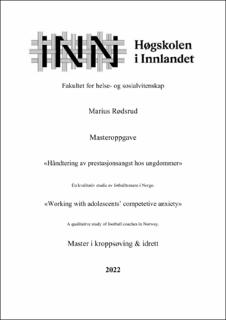| dc.contributor.advisor | | |
| dc.contributor.author | Rødsrud, Marius | |
| dc.date.accessioned | 2024-01-30T17:10:39Z | |
| dc.date.available | 2024-01-30T17:10:39Z | |
| dc.date.issued | 2022 | |
| dc.identifier | no.inn:inspera:111683710:68823952 | |
| dc.identifier.uri | https://hdl.handle.net/11250/3114686 | |
| dc.description.abstract | Hensikten med studien er å undersøke hvordan fotballtrenere arbeider med prestasjonsangst hos ungdommer. Det innebærer hvordan trenere oppdager, håndterer og jobber med det kontinuerlig.
I oppgaven er det brukt to teoretiske perspektiver. Det ene perspektivet er Chelladurai sin multidimensjonale modell av lederskap (2007) og emosjonell intelligens av Mayer & Salovey (1997).
Det er en kvalitativ studie hvor det er gjennomført fire delvis strukturerte intervjuer av fotballtrenere som har ungdommer på laget sitt. Dataen er analysert i henhold til en tematisk analysemetode.
Fotballtrenere viser seg å oppdage prestasjonsangst gjennom en atferdsendring i garderobe eller på fotballbanen. En annen måte det er mulig å oppdage prestasjonsangst på er ved å kartlegge spillernes mestring over en periode, også kalt trafikklysmodellen. Trenerne har tre ulike strategier for å jobbe med prestasjonsangsten. De ufarliggjør fotballen for spilleren. De setter spillerne i posisjoner eller situasjoner hvor spilleren lettere kan lykkes. Eller de tilpasser etter spillerens ønsker og behov. Samtidig påpekes det at arbeidet med prestasjonsangst er en kontinuerlig prosess, hvor en av nøklene er en god relasjon til spillerne.
Nøkkelord: Fotballtrenere, prestasjonsangst, ungdommer, multidimensjonal modell av lederskap, emosjonell intelligens. | |
| dc.description.abstract | The aim of this study is to investigate how football coaches work with competitive anxiety in adolescents. This involves how they discover, handle and work with it on a daily basis.
This thesis has used two theoretical perspectives. The first perspective is Chelladurai´s multidimensional model of leadership (2007) and the second perspective is emotional intelligence by Mayer & Salovey (1997).
This is a qualitative study where the collection of data came through four partially structured interviews of football coaches which has adolescents in their team. The data is then analysed according to a thematic analysis method.
This study shows that football coaches discover competitive anxiety in their players through behavioural change in the locker room or on the field. Another way they discover competitive anxiety is by mapping the players´ feeling of mastery over a period of time, also called the traffic light model. Football coaches in this study has three strategies for working with competitive anxiety in their players. They try to downplay the importance of football for their players. They put the players in positions or situations where the possibility of success is high. Or they try to adapt to their players´ wishes and needs. At the same time the results from this study shows that working with competitive anxiety is continually process, where one of the keys to success is a good relationship with the players.
Keywords: Football coaches, competitive anxiety, adolescents, multidimensional model of leadership, emotional intelligence. | |
| dc.language | nob | |
| dc.publisher | Inland Norway University | |
| dc.title | Hvordan arbeider fotballtrenere med prestasjonsangst hos ungdommer? | |
| dc.type | Master thesis | |
